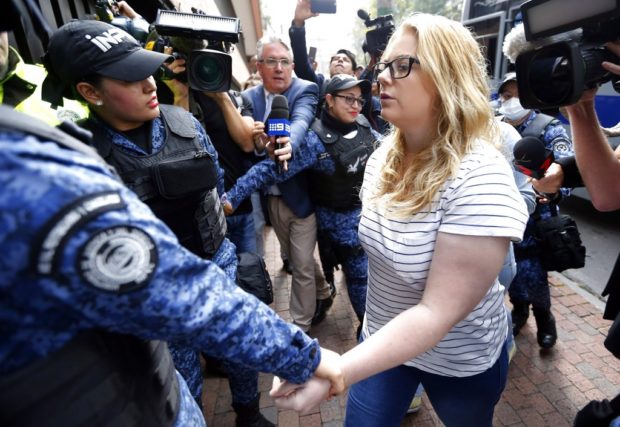
Australian Cassandra “Cassie” Sainsbury, 22, is escorted by police to a court hearing in Bogota, Colombia on Wednesday, November 1, 2017. Sainsbury was later sentenced to six years in jail and ordered to pay a fine of nearly $100,000 for trying to smuggle nearly 6 kilograms of cocaine out of Colombia. (AP Photo/Fernando Vergara)
BOGOTA, Colombia – A judge in Colombia sentenced on Wednesday an Australian woman to six years in jail after she pleaded guilty to drug trafficking in a high-profile case that has shed light on the plight of foreign drug mules.
Cassandra Sainsbury, 22, was accompanied by her family as the judge accepted the plea deal – a huge reduction from the 30 years in jail she faced had the case gone to trial. She was also ordered to pay a fine of nearly $100,000.
Sainsbury’s lawyer Orlando Herran said that with good conduct, his client could be released from prison in as little as two years and placed under house arrest even before then.
Sainsbury was arrested in April at Bogota’s international airport, boarding a flight to London, after an X-ray machine detected in her luggage about 6 kilograms of cocaine stashed in packages of headphones that she told police she had purchased to bring back to Australia for her wedding. However, she changed her story several times, later claiming she had been set up and threatened by people back in Sydney, where she said she worked as a receptionist at a brothel.
Prosecutors, in seeking leniency, were persuaded that her crimes weren’t so black and white, said Herran.
“She’s lucky because the amount of the drugs was very big,” he told a bevy of Australian journalists, who traveled to Colombia after the closed-door hearing.
Sainsbury’s arrest garnered top attention in Australia, where tabloids alternated between mocking the Adelaide native as “Cocaine Cassie”, and expressing sympathy with the plight of Australia’s highest-profile foreign prisoner.
But the few Colombians who followed the case at all tended to be deeply offended by her family’s early statement that she couldn’t receive a fair trial in such a “corrupt country.”
Colombia is the world’s largest producer of cocaine and its police were among the best trained to detect and stop drug smuggling, partly owing to the billions of dollars in United States anti-narcotics aid that has strengthened law enforcement.
Many families have sad tales of loved ones who spent years behind bars in the US and elsewhere after being drawn by economic hardship into the lower rungs of the drug trade.
As tourism to Colombia has boomed over the past decade, the country’s drug cartels are increasingly recruiting foreigners to smuggle cocaine out of the country. So far this year, Colombian police have arrested 67 foreign drug mules. /kga